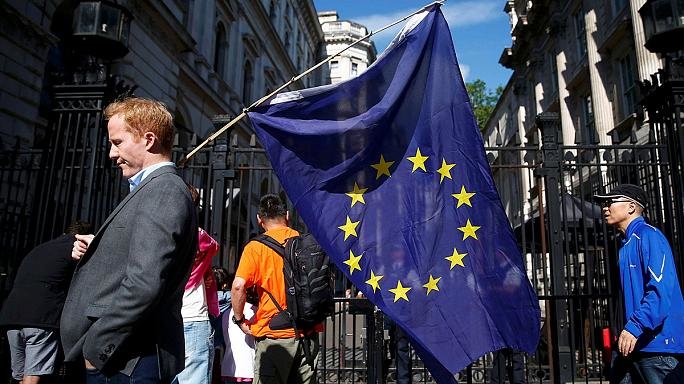Today's Europe at a Glance

TEHRAN _ Today, news about the developments in Germany has been heavily popularized by Western media. The failure of Angela Merkel to form a coalition with Greens, Social-Christians and Free Democrats has led to political turmoil in Germany and subsequently, in the European Union. Negotiations for the formation of a coalition government in Germany between the two traditional and rival parties in this country, the Social Democrats and the Christian Democrats, has resumed.
However, many analysts in European affairs agree that Merkel's authority in the Green Continent has come to an end. What is really going on in Europe? Can we come to a clear picture of today's Europe by examining the "signals" and "events" in this continent? Here are some important points that need to be taken into consideration:
Firstly, the representatives from the far right movements were able to win over one hundred seats in the European Parliament during the 2014 European Parliament elections. The 43 percent participation by citizens in the 2014 parliamentary elections, on the one hand, and the relative victory of the right extremists in this election on the other hand, were both severe shocks to the entity of the United Europe. Since 2014, about 120 seats from the European Parliament are under the control of those who essentially don't accept the existence of the United Europe and the Eurozone.
These people are calling for a return to the time before the existence of the European Union.After 2014, radical right parties across Europe found extended powers. Many nationalist parties, in the shadow of the weakness and inability of the moderate parties (conservative and socialist), were able to manifest themselves in the social body of the community. Not long ago, radical right-wing movements (nationalist and anti- United Europe, anti-Islamist and anti-immigrant movements) were basically unable to obtain the least possible votes for entering the European Parliament. For example, the Alternative for Germany (AFD) in the 2013 general election, couldn't gain 5% of the votes which was the minimum required for attending the German parliament (Bundestag). But now, in 2017, the party gained about 13% of the vote, and thus became the third strongest party in Germany after the two parties of Christian and Social Democrats.In countries such as France, Austria, Sweden and Italy, the right-wing extremists could enormously succeed in the political and social grounds. It is expected that by 2020, far-right parties will become the most popular political parties in their countries.
The second point is about the "political-structural" conflicts in the European Union. Undoubtedly, the growing and progressive growth of the votes of nationalist parties is synonymous with the highlighted desire of "returning to the past" among the citizens of various European countries. Over the past two decades, most European citizens believed that by "signing the Schengen Treaty", "using the common European currency", "the European protectionist approach in the field of economics", "the economic and political synergy of European players," etc., "The advantages" of forming the United Europe is far greater than its "costs". Thus, nationalist parties were not accepted by the public opinion and couldn't come to power in the European countries.But now the equation has changed! Many European citizens "find less advantages" in the survival of the European Union. They believe that what they get is much less than what they're paying for. Consequently "nationalism" as a politically accepted current is becoming more and more popular in the European countries.
The third point is the inability of European politicians such as Angela Merkel to maintain the existing political and economic structure, and to face the constant economic, security, political and social crises in Europe. The fact is that the Chancellor of Germany, whose country is the main economic and political leader in Europe, doesn't understand the profound transformations and infrastructure in the Green Continent. Merkel and her entourage sought to impose "exterior and specious reforms" in Europe in 2014, following the drastic triumphs of the far-right parties in the European parliamentary elections.The German Chancellor and people like Jean-Claude Juncker, Martin Schulz, Donald Tusk and other European executives who have played a major role in managing the developments in this collection, have never wanted to see and admit to a reality called "infrastructural contradictions" in the United Europe. They thought that the emergence of extremist parties was merely sort of reaction by the European citizens to the weak performance of the moderate parties. But that was not all!
Western officials must accept the bitter truth that the patterns and foundations have changed in the minds of citizens in different countries of the European Union, and this has greatly affected the "future of the United European and the European Union." We are facing an antagonistic, infrastructural and fundamental contradiction in Europe. To deal with this challenge, the "European reformist" approach isn't going to help. In such a situation, the only way for people like Merkel is to "redefine the European Union". This redefinition would be costly and difficult, but is the only possible way to save the "traditional United Europe" in the current situation.
Jacques Derrida, the postmodern philosopher, who is best known for developing a form of semiotic analysis known as deconstruction, which he discussed in numerous texts, and developed in the context of phenomenology, believes that the demolitionand rebuilding of patterns should be done by the makers themselves. Will the EU finally succeed in redefining the European Union and preventing the continuation of the current process (which is absolutely to the benefit of nationalist groups)? Or will the EU and the Eurozone disappear in the near future? Will the term of "national citizen" be replaced with the "European citizen" in the coming years? These are the questions that many of them will be answered by 2020.
